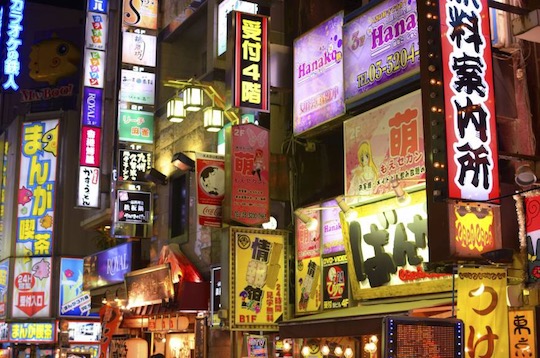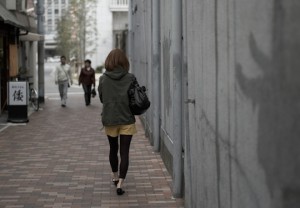Middle-aged prostitutes increasing in Japanese sex industry
The Japan Times recently published a long and sympathetic article about the sex industry in Japan.
It superbly shows how the women who ply their “trade” in the sex industry often do so because of economic hardship.
For the past six years, 47-year-old single mother Kasumi Endo has lived a double life.
On weekdays, she works all day as a temp-staff office worker to raise her teenage daughter. But with wages hardly sufficient to keep the household afloat, Endo (not her real name) takes a surreptitious trip to Tokyo’s downtown Ikebukuro district on weekends to earn extra money.
As she climbs the stairs to exit JR Ikebukuro Station, she gradually switches her normal self off and wills herself to accept that she is now someone else: a professional working in Japan’s fuzoku sex industry.
“When I first decided to join the industry, I did so with great reluctance. I didn’t know whether it was the right thing to sell my identity as a woman. I even felt guilty for my daughter when I imagined a stranger touching the sacred part of my body where she was born,” said Endo, who agreed to be interviewed on condition of anonymity because she keeps her side business a secret from those around her, including her 19-year-old daughter.
Endo belongs to the seemingly burgeoning cohort of Japan’s impoverished middle-aged women gravitating toward the sex industry, despite its widespread life-threatening risks.
We might think of the Japanese sex industry as being mostly full of exploited young women, or Chinese and Korean women — many the victim of human trafficking.
But there is a growing number of middle-aged Japanese women forced into working in the industry because they have no other way to eat.

The article links this to a general trend among women in Japan to be engaged in irregular work such as part-time and temporary jobs rather than secure, better-paid employment that also offers social security benefits.
It’s even worse for single mothers.
A 2011 study of single-parent households by the welfare ministry revealed that 47.4 percent of working moms eked out livings as part-timers, earning an average of ¥1.25 million per year, and 4.7 percent held jobs as temporary workers. Among men, only 8.0 percent of working dads were part-timers, and earned an average annual wage of ¥1.75 million.
For her part, Endo, who had worked part-time customer service jobs from her mid-30s to 40s that earned her just over ¥1 million yen a year, became the Japanese equivalent of a call girl in the so-called deriheru (“delivery health”) industry in 2010 after her husband fell several hundred million yen into debt.
She divorced him three years later over another debt problem and saw her monthly income plummet to about ¥120,000 on a take-home basis, comprising her earnings as a part-time worker and call girl.
While she recently switched to being a temporary worker with full-time hours, she wound up jobless at the end of June when her contract expired. With her rent late this month, Endo said she was popping out of her deriheru shift when possible to desperately take in one job interview after another.
Pick any article about the Japanese economy and all seems to be doom and gloom: not if you are only talking about the sex industry, or fuzoku industry made up of soaplands, call-girl services, massage parlors, streetwalkers, and more. The market took in an estimated ¥3.5 trillion in fiscal 2014, according to Yano Research Institute.
The article spoke to several other women working in the industry.
Fuzoku sometimes proves to be the only viable career option for financially challenged women, particularly single mothers, due to its considerably loose working style.
“Fuzoku is the most convenient part-time job you can possibly think of,” Shizuka Yamaguchi, a 45-year-old nurse from Kanagawa Prefecture who moonlights as a deriheru call girl in Ikebukuro, said. Yamaguchi (not her real name) said she delved into the industry about a year ago to help offset a plunge in household income after her husband lost his career.
“As a nurse, you’d have to complete the pre-assigned shift in order to earn, say, ¥10,000 a day. But this won’t be an issue in this industry — you can just call your boss and show up whenever you feel like it, day or night, using whatever free time you’ve got to yourself.”
Add to this flexibility the instant payment aspect, and cash-strapped women like Shoko Hayama, 48, find the business a life-saver the likes of which she believes is nonexistent anywhere else.
As of July, Hayama (not her real name), who works at the same parlor as Yamaguchi, said she and her husband owed about ¥300,000 in back rent and were on the verge of being evicted.
Her husband lost his job as a truck driver after a traffic accident in January, which led the pair to resort to a black-market lender for what eventually snowballed into ¥2 million in debt under the exorbitant interest rates.
Hayama, who requested her real name not be published because she keeps her plight hidden from her husband, said she is considering filing for personal bankruptcy.
“Even if I take up a job as a temporary worker, it isn’t until a month later that I can get paid. I used to have my name registered with a temp agency, but in many cases, daily payment is only possible like four times a month,” she said, noting her job as a call girl rewards her with half of the ¥6,000 in cash she gets from each 70-minute session with a customer. The other half goes to her employer.
“We’re even struggling to feed ourselves every day. My wallet is always empty,” she said.
The article also highlights how the fuzoku industry itself then steps in to provide some of the support that the state’s inadequate welfare cannot give, offering places to stay or even arrange for day care for children.
Of course, this all kinds with risks: social stigma, rape, stalking, revent porn, and STDs.
There is a great quote from a delivery health chain boss. “There is no doubt that the risks are huge. In the worst-case scenario, you could die,” said Akinori Saito, president of a deriheru chain called Okaasan (Mothers). Saito makes efforts to protect his 500 call girls, such as not carrying ID and regular STD testing.
“It’s always possible the women have to deal with some kinds of criminals. We can’t eliminate the risk, although we can certainly reduce it,” he said.
The article points to a double bind: sex work is socially stigmatized, but also partly because of the misguided notion that all sex workers are exploited and abused. This is not the case for all and with proper regulation and support, the industry could actually be safer for both sex workers and customers. Various non-profits and others are working towards providing consultation and welfare or legal assistance for sex workers.
It ends with a powerful statement from a Keio University scholar.
“Branding the industry an evil unconditionally will ultimately deprive women of self-esteem and the kind of ‘bargaining power’ that is crucial to their negotiations with customers or employers, and further weaken their position… Rather, the focus should be on how to boost anti-poverty support in society to save women who work in the industry against their will,” she said.














